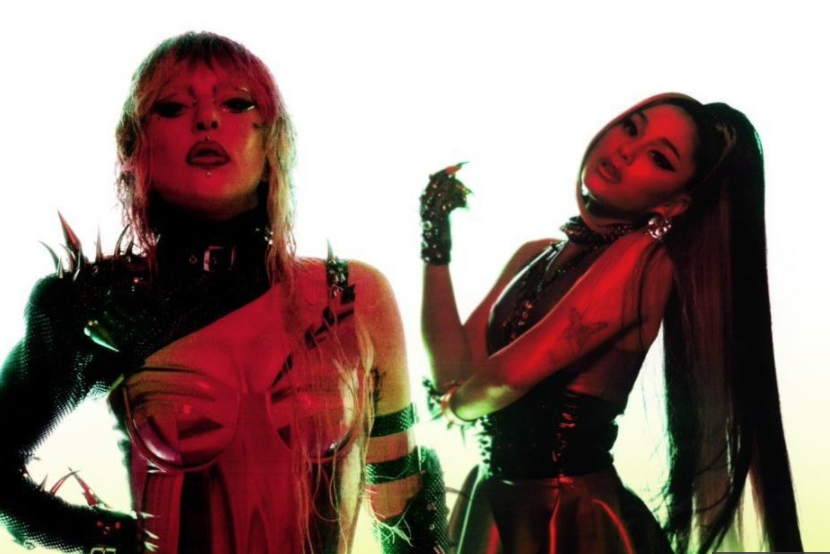In the tradition of gay icons having songs about rain–from Barbra Streisand’s “Don’t Rain On My Parade” to Geri Halliwell remaking “It’s Raining Men” to Madonna’s “Rain” to Rihanna’s “Umbrella”–the cliche about the (often sexual) metaphor of this weather phenomenon has been well-played out at this point. Aside from the sun and the moon, there is no other trope in nature that gets half as much play in “poetic” songs designed to illuminate catharsis. In Lady Gaga and Ariana Grande’s case, they clearly did not want to bank on the gay kryptonite of their togetherness alone. No, they wanted something worthy of being an anthem fit for a dance floor (even if dance floors will never again be as carefree, ‘cause if you’re not gonna get corona or some other pandemic disease, you’re probably gonna get shot up just for being there). Something that speaks to the “gay experience” as a white woman sees it (yes, let us not forget Ariana is the same Italian-ish breed as Lady G, though much tanner). While Ariana and Lady G have had their share of struggles (Ariana probably more), the song expresses a wish to repurpose those struggles as badges of honor (as Trump would call the million-plus coronaV cases). The way gay men have had to do time and time again in the face of discrimination and second class citizenry.
At the same time, Ariana probably said all of this better on 2018’s “No Tears Left to Cry”–another less obvious gay anthem (backbeat-wise) centered on the imagery of cascading water (i.e. tears) and its healing abilities. When joined with Lady G, the Italian Catholicness inherent in both of them gets real as they belt out in unison, “I can feel it on my skin (it’s comin’ down on me)/Teardrops on my face (water like misery)/Let it wash away my sins/Let it wash away, yeah.” Similarly, Madonna, the OG mack daddy of exploring Catholic guilt and redemption in pop music, sings on 2015’s “Wash All Over Me” (from Rebel Heart, an album that BloodPop, the producer of “Rain On Me,” collaborated on along with numerous others), “Let it come, let it rain, rain all over me/Like the tide, let it flow/Let it wash all over me, over me.”
The allusion to the baptismally cleansing power of water in these Catholic girl manifestos being evident in both tracks, it bears a certain irony that, until it was “chic” to do so, religion–least of all Catholicism (which is odd, considering the homoeroticism that runs rampant within it)–has never offered a place for gay men, only, instead, vitriolic shunning. Yet it is so often the women who grew up amid this repressive type of “spiritual” upbringing that attract the highest density of gay fans–for who can relate better to early repression than a homo male? To boot, dichotomy is intrinsic to a song that discusses the gratitude one feels for pain. Indeed, one can imagine them in the studio channeling Lieutenant Dan in Forrest Gump while he’s sitting on the deck of a ship amid a hurricane-like storm, screaming at the rain to keep coming, to give him its best. Urging, “I hear the thunder comin’ down/Won’t you rain on me?” Because the sooner the storm passes, the sooner one can be dry (dry, in this case, also being a reference to Lady G’s alcoholic tendencies) again. Theoretically.
In contrast, the full-stop shittiness of rain was at least something Ashanti could address without rose-colored glasses on the 2005 hit called, what else, “Rain On Me,” in which she doesn’t try to say that precipitation is something pleasant, or to be looked at as a silver lining with regard to getting through the pain by “cleansing it” very literally. Instead crying, “I’m so tired of the rain in my life/And I’m so tired of the strain and now you’re gonna lie.” Lady G and Ariana, in lieu of outright acknowledging that this perpetual rainy existence (as heightened by a pandemic state) more than just kind of blows, try to see the bright side of it all with the lyric, “I’d rather be dry/But at least I’m alive.” Eh, is being alive that much of a consolation in these restrictive conditions that ain’t going away? To add to the drama of it, Lady G slowly sounds out tauntingly, “Rain. On. Me.” in the same vocal styling as she did to say, “Don’t be a drag, just be a queen” on “Born This Way.”
To the point of thunder and rain imagery, and what it has long alluded to (splooging), the sexual innuendo of the phrase “rain on me” is chastely avoided (so maybe the track ain’t that gay after all) by the duo in direct contrast to Madonna’s (whom neither woman has ever denied being inspired by) embracing of it on the Erotica album, specifically “Where Life Begins,” during which she sings in a hyper-sultry tone, “I’m glad you brought your raincoat/I think it’s beginning to rain.” But there are no “raincoats” for these two, going decidedly “raw dog” as they let the storm wash over them and declare it as a victory for surmounting trauma.
While a positive message delivered at a time when people are clamoring for it (so that they can continue to live in their Blanche DuBois state of denial), something about “Rain On Me” feels deliberately contrived to appeal to the gays (a core of both pop stars’ audience)–as Janis Ian would say, the song is “almost too gay to function,” if you will. Naturally, “Hey, that’s only okay when gays say it” will be the response to such an assessment–of course the gays will be too busy to make that judgment while in the midst of choreographing a TikTok video in preparation for the glorious moment when they think club life–and the dance floor that goes with it–will return to normal.




















